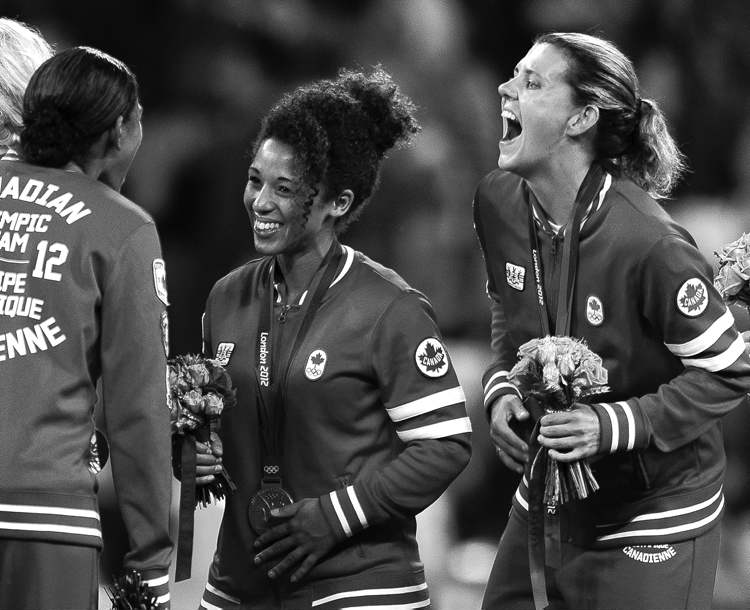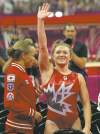Eh, could have been better
Some memorable moments, but unexceptional overall
Advertisement
Read this article for free:
or
Already have an account? Log in here »
To continue reading, please subscribe:
Monthly Digital Subscription
$1 per week for 24 weeks*
- Enjoy unlimited reading on winnipegfreepress.com
- Read the E-Edition, our digital replica newspaper
- Access News Break, our award-winning app
- Play interactive puzzles
*Billed as $4.00 plus GST every four weeks. After 24 weeks, price increases to the regular rate of $19.00 plus GST every four weeks. Offer available to new and qualified returning subscribers only. Cancel any time.
Monthly Digital Subscription
$4.75/week*
- Enjoy unlimited reading on winnipegfreepress.com
- Read the E-Edition, our digital replica newspaper
- Access News Break, our award-winning app
- Play interactive puzzles
*Billed as $19 plus GST every four weeks. Cancel any time.
To continue reading, please subscribe:
Add Free Press access to your Brandon Sun subscription for only an additional
$1 for the first 4 weeks*
*Your next subscription payment will increase by $1.00 and you will be charged $16.99 plus GST for four weeks. After four weeks, your payment will increase to $23.99 plus GST every four weeks.
Read unlimited articles for free today:
or
Already have an account? Log in here »
Hey there, time traveller!
This article was published 13/08/2012 (4811 days ago), so information in it may no longer be current.
LONDON — Memorable moments, yes, but Canada’s overall performance at the London Olympics was unexceptional.
The same number of medals won as 2008 with fewer gold and silver, while falling just outside the goal of a top-12 finish in the overall medal count was a lukewarm outcome.
That doesn’t diminish the feats of Canada’s medallists in London. On the biggest stage in sports, they rank among the top three in the world.

Eighteen medals put Canada 13th in the overall medal count, two behind Hungary and the Netherlands, who were tied for 11th. Canada finished with one gold, five silver and a dozen bronze.
The country won three gold, nine silver and six bronze at the 2008 Games to finish tied for 14th in Beijing.
The lone gold medal in 2012 is the fewest for Canada at a Summer Olympics since 1976, when the host country won zero in Montreal. Canada was the only country in the top 25 with fewer than two gold medals.
The Canadian Olympic Committee, Own The Podium and summer sport federations set a target of winning enough medals to finish in the top dozen countries in the overall medal count in London. So the colour of the medals didn’t matter. Top-12 was deemed achievable, but also ambitious.
If moving up the rankings at Summer Games is important to Canadians, it will be a more difficult road than the top-three result Canada achieved in the overall standings at the 2010 Vancouver Winter Games.
Canada heads to the 2014 Winter Games in Sochi, Russia, intending to be No. 1. The country surprised itself by winning the overall gold medal count in 2010 with 14.
But there were 204 countries competing in London, compared to 84 in Vancouver. Small-population countries produce sprinters and wrestlers who take medals off the table.
Canada’s objective for Rio de Janeiro in 2016 will be set following a debrief of the team’s results in London. Winter sport took leaps forward when Canada hosted the Olympics in 1988 and 2010.
Summer sport is benefiting in the afterglow of 2010 in terms of a unified sport system, but progress to the podium — and up it — has been slower.
“I think this is going to take a bit of time to settle in, this new environment that we’re in,” paddler Adam van Koeverden said. “All the support is going to take a few years to trickle down and really have a gross impact on the enormous scale that I think it will.
“I couldn’t be more stoked to be a member of the Canadian team. It’s my third Olympics. I’m inspired to continue.”
Of the athletes who were top-five in their respective world championships last year, 60 per cent produced an Olympic medal in London. The conversion rate in Beijing was 67 per cent. It was 34 per cent in 2004 when Canada won 12 medals in Athens.
The U.S., winner of 103 medals, had a conversion rate is over 70 per cent, according to COC analysts.
Among those tabbed to win a medal here, mountain biker Catharine Pendrel, shot putter Dylan Armstrong and track cyclists Tara Whitten and Zach Bell did not. Former world champion Mary Spencer lost early in boxing. World champion van Koeverden produced a silver medal in the 1,000 metres.
While some medal contenders faltered, unexpected medals such as Derek Drouin’s bronze in high jump and Antoine Valois-Fortier’s bronze in judo helped Canada’s bottom line.
Rosannagh MacLennan stepped out of the shadow of multi-medallist and teammate Karen Cockburn to produce a gold in trampoline.
“We’re not a team that’s like ‘Gee I’m going to go for third because I don’t want first.’ Everybody wants to win,” Canadian chef de mission Mark Tewksbury said. “It’s not like a shame if you get a silver and I think that’s really important.
“I ran into one of the rowers today and he said ‘I really learned how to love a silver and see how precious that is.’ If it’s all or nothing, sometimes that’s a pretty brutal way to go through life.”
Canadians won medals across 11 sports in London, compared to 10 in Beijing.
Own The Podium has about $35 million per year of taxpayer money to spend on summer sport. Rowing, diving, women’s wrestling, trampoline and canoe/kayak received the most money in the four years since Beijing and all produced medals.
The second tier included swimming, track and field, equestrian and women’s soccer. All generated medals except equestrian. The death of Eric Lamaze’s horse Hickstead last year was a blow to medal prospects.
The third category included the “long shots” of cycling, triathlon, synchronized swimming, sailing and judo. Cycling appeared poised to win a few medals, but one bronze was the result.
The swim team and paddling team led the way with three medals apiece.
Women’s soccer and swimming were the breakout sports in 2012. After no swimming medals in Athens and one in Beijing, the swim team picked up a silver and two bronze.
The medal that captured Canada’s imagination the most — and is expected to have the most impact post-Games — was bronze.
Millions watched and tweeted as Canada lost a semifinal 4-3 in extra time to the U.S. They followed captain Christine Sinclair and the Canadian team in winning a bronze against France. Sinclair was chosen Canada’s flagbearer for the closing ceremony.
“Every member of the women’s soccer team that’s in London will go back and just be heroes in their communities and their hometowns,” OTP’s Anne Merklinger predicted. “It will inspire thousands and thousands of young girls to sign up for soccer, and boys. They’ll have a whole new set of role models.”
— The Canadian Press









